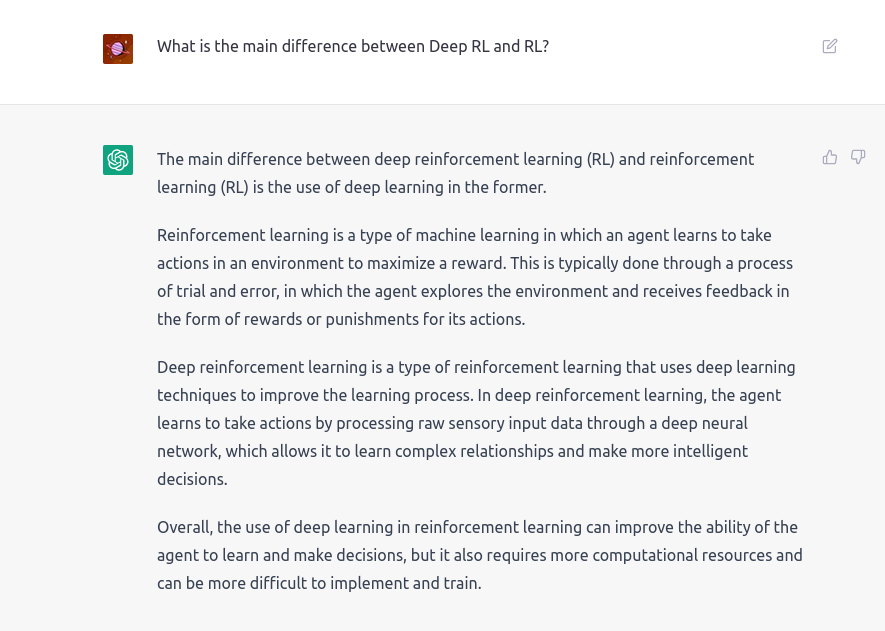There are some aspects of academic writing that you need to consider if you want to use AI-generated text passages. I'll address four of them in my answer: Licensing, Plagiarism, Argumentation, Referencing.
Licensing issues
Language models are trained on source texts, and these source texts are typically harvested in great volumes from publications (online or print) without much concern for the license under which the text was published. Thus, the input for the language model may containmaterial that is not licensed for this type of processing. Consequently, the status of the model and of the work generated by the model is a legal gray area. Here's an article that discusses this "legal minefield" for AI-generated images, some of which are based on the OpenAI software. Much of the discussion applies directly to AI-generated texts.
Accusations of plagiarism
To my understanding, AI-generated content depends on associations between training data and classification data. Input data might be for instance a collection of photographs together with a classification matrix. This matrix expresses whether each image contains e.g. a car, a bicycle, a staircase, a zebra crossing, a traffic sign etc. Training an AI basically means to develop a mathematical model that expresses the learned associations between the images and the classifications. The resulting model can make a prediction whether an image that was not part of the training data also shows a bicycle. In this way, the model functions as a classifier. But you could also reverse the model logic by asking the model to generate an image that contains a bicycle. The AI model will use the learned associations between image information and classification to produce an AI-generated image of a bicycle.
A potential problem in this process may arise from data scarcity. If the training data contains only very few images of a bicycle, the generated image will be very similar to the input. This means that if e.g. the prompt for your text generator is highly specific, the output text may be very similar to the few input texts that the AI can draw from to generate the text. This is called AI plagiarism.
So, the AI-generated text may be a direct plagiarism of another published text. But to you as the end user, there is no way of knowing how similar it is, and there's no way of checking the actual texts that the model used to generate the text based on your prompt. This means that if you publish an article that contains AI plagiarism, and if somebody realizes the similarity between your article and other published material, they can rightfully charge you with plagiarism. Your only excuse would be that you didn't write that section, the AI did. But in an academic context, this will still ruin your academic reputation.
Argumentation
Academic writing depends on coherent and cohesive argumentative elaboration. While AIs have made huge progress in that regard, this is still something that needs to be checked very carefully. AI models don't understand the argumentation of an input text in any sense that relates to human understanding. At best, an AI model generalizes over argumentative patterns recurring in several input texts, and it uses these generalizations to create a text that resembles these argumentative patterns. It is your task as an author to ensure that the generated argument is indeed valid. You can only do this if you know the subject matter well enough – but you can ask an AI model to generate a text for a topic that you're completely ignorant of. Much responsibility is required at this point.
Your example text illustrates this. To me as someone who isn't an expert in reinforcement learning, the description sounds reasonable. But I can't judge whether it's actually correct. I would never dare to use this passage without reading up on the difference in detail so that I can verify the passage. But then, I could just as well write the section myself.
Referencing
One rule that every first-year student should learn is that academic writing needs proper referencing. If you make claims, you should back up the claims by references. If you report previous work, you need to provide sources.
However, an AI model doesn't know about referencing. It may learn that after particular text patterns other typical text patters occur. So an AI may learn that sentences from the academic genre very often end in sequences like (ABCDE 1234). because very often, the input texts will provide references for a statement in a sentence at the end of the sentence, and the format of this reference is often (Author Year). However, the AI doesn't know what this pattern means. It doesn't know that you can't use the most probable letter-number sequence here, but that it has to refer to an existing source. Obviously, this is less than useless – it's actively invalidating the academic quality of your text.
Alternatively, the AI may not produce any reference, which is also unacceptable and requires your intervention as the author. The generated text in your example doesn't contain references – but it contains many claims for which I as a reviewer would ask for sources to back up the claims. Again, it would be your task as the author to find sources for each of these claims. And since the AI didn't use sources in any sense of term "source" as used in academic contexts, it may even be impossible to provide appropriate references for an AI-generated text that satisfies the very strict standards for referencing.
Summary
AI-generated texts are an interesting development, but it's a topic that is so novel that there are many unresolved issues (both legal and ethical), and also many aspects that ask for a high degree of responsibility and knowledge from the author.
My assessment may change in the future, but as of today I'd advise against using AI-generated texts in academic writing.

